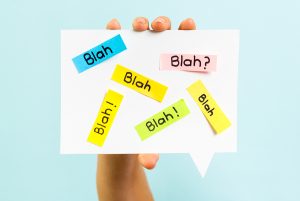Discover the Traits of being a great communicator

Are we really good a communicating? Ask anyone individually and the answer always seems to be a resounding ‘YES!’ Probably as you read the headline of this post you told yourself “Yeah, I’m pretty good!” That’s because every single one of us, even if we are not a professional speaker, would like to be known as a great communicator. It means we have impact and influence.
Not Really All That Great
Unfortunately, we are fooling ourselves. Think about this. If we are so good at communicating then why is it that a Gartner study shows that 70% of workplace mistakes are communication driven? And according to author David Grossman, businesses incur about $26, 041 per employee due to poor communications.
If we are all great communicators, why such a huge communication breakdown?
Most certainly it is clear that communication is not really taking place.
The single biggest problem in communication is the illusion that it has taken place.
George Bernard Shaw
Learn to be a Great Communicator
In spite of that, the good news about communication is that it is primarily a learnable skill. You can learn to be a great communicator when you know what and how and where. What makes for excellent communication. How do you work on the skills. And where do you start.
To help with that, take this little quiz below. Being a great communicator involves not just how we say things but also how we listen. In fact, being a great communicator is more about listening than talking.
So this quiz includes factors for each. For each statement, identify how well you do it. This quiz is meaningless if you are not totally honest with yourself so be tough. Give yourself 1 point for rarely, 2 points for sometimes, 3 points for usually, and 4 points for always. Explanations of each concept follows the statement.
Great Communicator Quiz
I allow the speaker to finish without interrupting
 Stephen Covey once said, “Most of us don’t listen with the intent to understand, we listen with the intent to reply.” We cannot really fully understand what someone else is trying to say if we don’t let them finish. That requires some patience. With some, you may have to hold on when they pause and wait until they really are done.
Stephen Covey once said, “Most of us don’t listen with the intent to understand, we listen with the intent to reply.” We cannot really fully understand what someone else is trying to say if we don’t let them finish. That requires some patience. With some, you may have to hold on when they pause and wait until they really are done.
Do you find yourself often stopping someone in mid-sentence to either cut them off short and give your response? If so, give yourself a 1 or 2.
I look for the subtext.
When listening it is more than just words, it is the context and meaning behind those words. You need to be able to read between the lines. Not make assumptions, but search for meaning. Also, look at non-verbal clues for the emotion behind the words.
As the speaker, non-verbal cues are also a big indicator. Rigid posture usually indicates defensiveness. Look at eyes and facial expression. Are they facing you or turning sideways. Arms or legs crossed can sometimes mean they are closing off to you. Look for more than one cue to confirm your conclusions, however. Sometimes arms or legs crossed is more for comfort than defense.
Give yourself a 3 or 4 if you are good about looking for clues; a 1 or 2 if you aren’t.
I actively try to retain important facts.
Communication is intended to be bilateral. What that means is that whether you are speaking or listening you are meant to be active. A part of active listening is making sure that you get at least the critical points of the communication. Take notes if possible.
I repeat the details of the communication to the subject in order to get everything right.
It’s not enough to just confirm hearing. We must confirm understanding as well. Achieving understanding is the responsibility of both the speaker and listener. As speaker, confirming understanding allows us to say it again a little differently. As the listener repeating the details back to the speaker means they can confirm that you understand the right message.
I avoid getting agitated or hostile when I disagree with the speaker.
 Have you noticed this one doesn’t seem to get a lot of practice out there today? When we don’t agree with the statements of others strongly it is somewhat natural to have an emotional reaction. Unfortunately, when emotions take over we can no longer depend on our hearing for accuracy. We will either hear what we want to hear or what we think they are going to say. As difficult as it is, we need to keep emotions in check if we really want to reach understanding.
Have you noticed this one doesn’t seem to get a lot of practice out there today? When we don’t agree with the statements of others strongly it is somewhat natural to have an emotional reaction. Unfortunately, when emotions take over we can no longer depend on our hearing for accuracy. We will either hear what we want to hear or what we think they are going to say. As difficult as it is, we need to keep emotions in check if we really want to reach understanding.
I tune out distractions when listening and I avoid being a distraction myself.
The majority of people believe they can multi-task. They are all wrong. We cover that in detail here. You can’t tap away on your smartphone and give someone your full attention at the same time. You can’t hold multiple conversations concurrently and be effective. EVERYONE deserves your full attention.
I make an effort to be interested in what the other person is saying.
If you are sharing a message with someone, you can tell when they aren’t even vaguely interested in what you have to say. Their attitude and their body language give it away and inevitably their words will too. You may do the same when someone is speaking to you. When we aren’t interested it doesn’t get our attention. Start by trying to be interested to give the communication a chance. Graciously end the conversation when it is no longer interesting.
I avoid the use of jargon or industry slang or acronyms.
 Within almost any group there will be shortcuts in communication. The slang and acronyms are typically known only to those in that circle. Do you know what RCA is? Your interpretation of that acronym would depend on your circle. It could be the company Radio Corporation of America. Or it could be Reformed Church in America. In some industries it stands for Root Cause Analysis. When communicating with others, we can’t assume they speak or understand our industry language. We must speak in terms they understand.
Within almost any group there will be shortcuts in communication. The slang and acronyms are typically known only to those in that circle. Do you know what RCA is? Your interpretation of that acronym would depend on your circle. It could be the company Radio Corporation of America. Or it could be Reformed Church in America. In some industries it stands for Root Cause Analysis. When communicating with others, we can’t assume they speak or understand our industry language. We must speak in terms they understand.
I attempt to connect with my audience.
Connection is critical to communication. When people know you care about them they are likely to be open to what you have to say. Do you try to show your audience that you care about them and not just getting your message across? Do you try to find common ground with them?
I adjust my message to my audience.
The same message cannot be conveyed the same way to the CEO as you would to the worker on the factory floor. It’s not a matter of perceived intelligence or even one of rank. It’s a matter of context and what they can relate to. Do you change what you say and how you say it to relate better?
I invite questions.
In general, I’ve discovered that most people who don’t welcome questions are either unsure of their message or not interested in whether you really understand it. Questions create the two-way exchange that leads to real understanding.
Add it up
Now add your score up. Here’s the breakout.
Did you score in the 9 to 17 range? You have a LOT of work to do to become an effective communicator. Think about some formal training and professional feedback.
If you scored 18 to 26 then you do employ some effective communication skills. You may want to identify areas where you can improve and intentionally develop those. Again, some formal training and coaching may help.
A score of 27 to 35 means you are pretty good to great communicator. You likely work at communicating effectively. What can you do to raise that score? A coach can help take you up to the next level.
If you got 36 you got a perfect score and you are truly a great communicator! Someone should take your DNA and clone you. That or you should be more honest with yourself.
Let me know how you scored or how you felt about the quiz. Contact me at psimkins(at)BoldlyLead.com. If you are looking to improve or help your organization, schedule a free Discovery Strategy Session with me TODAY.
